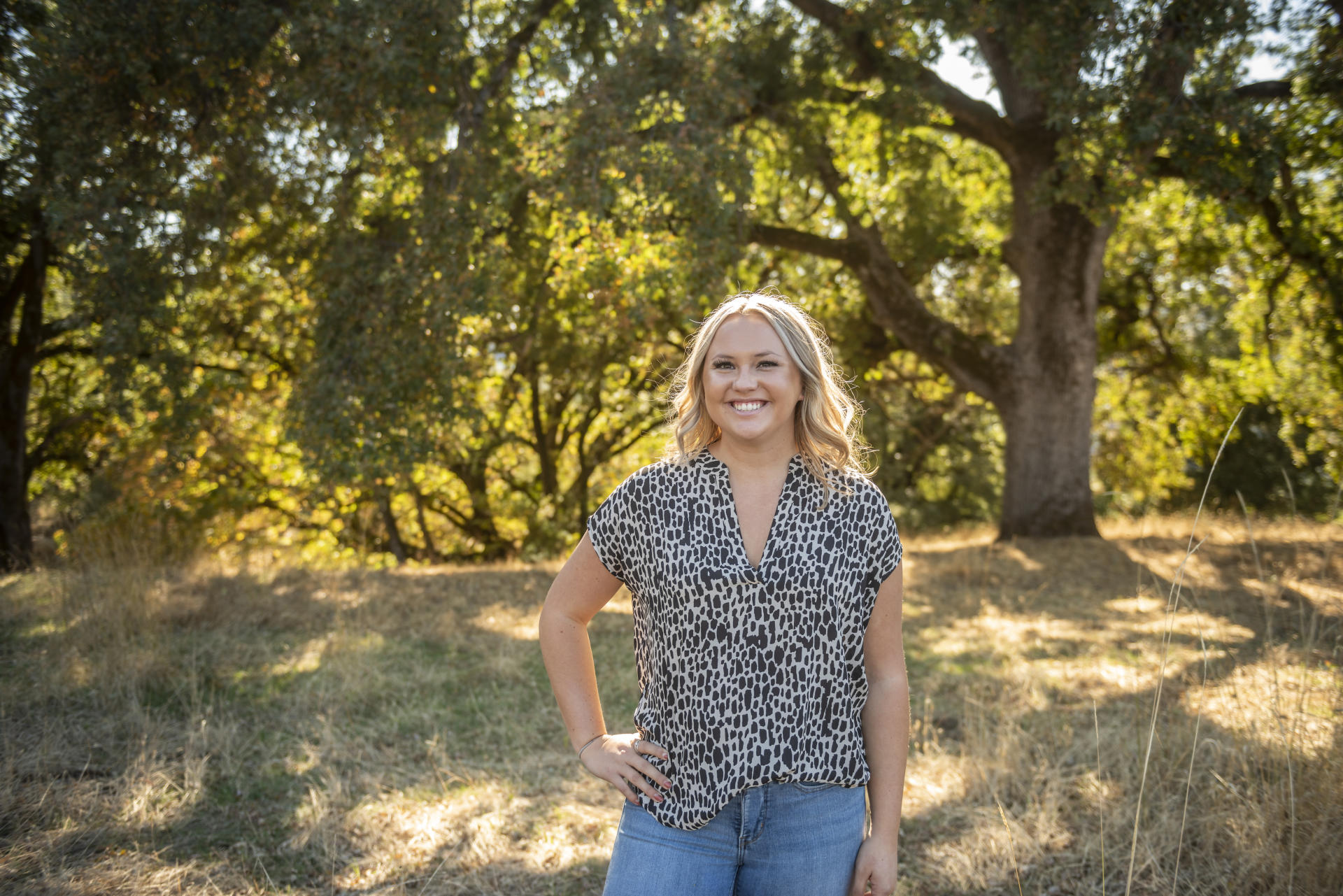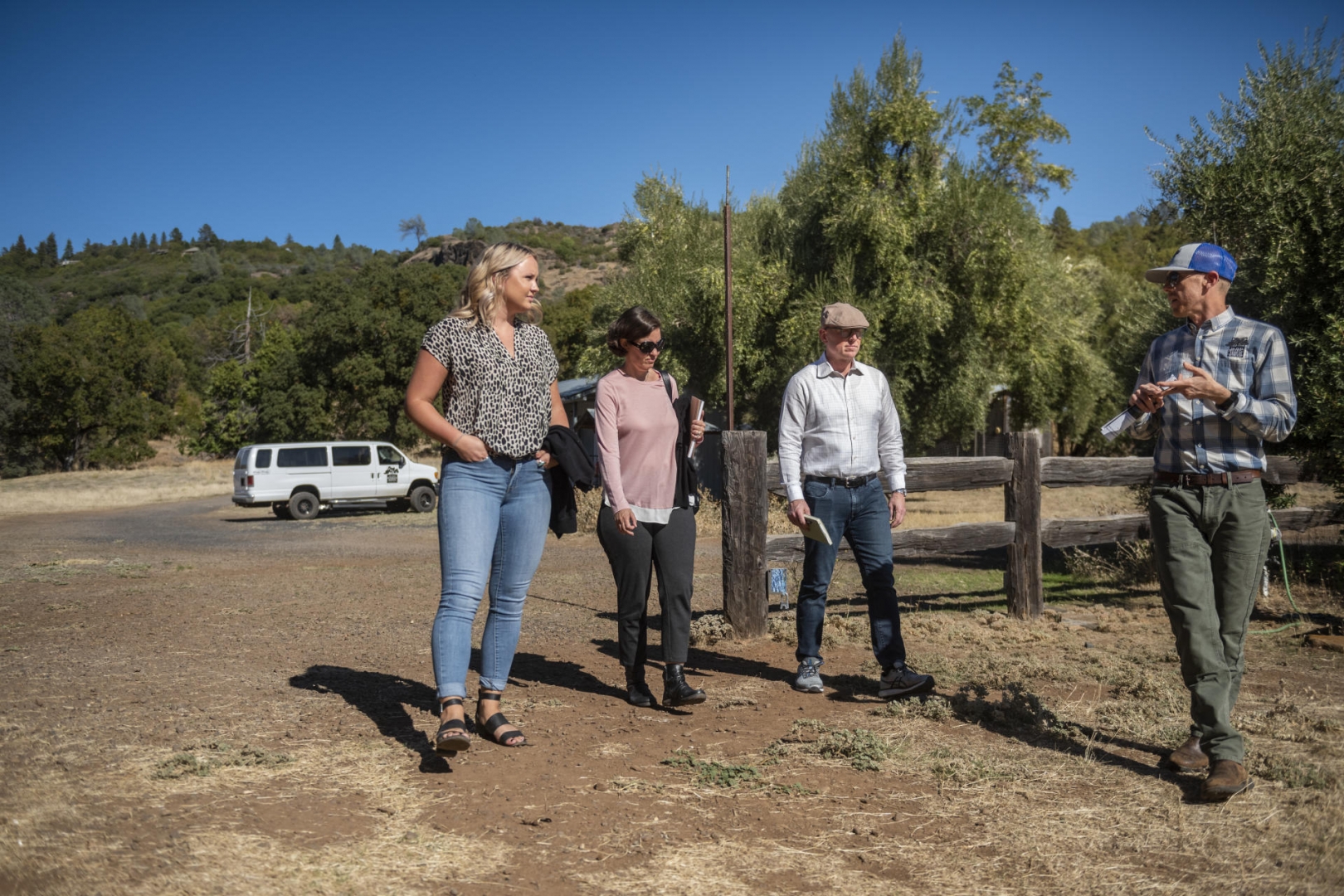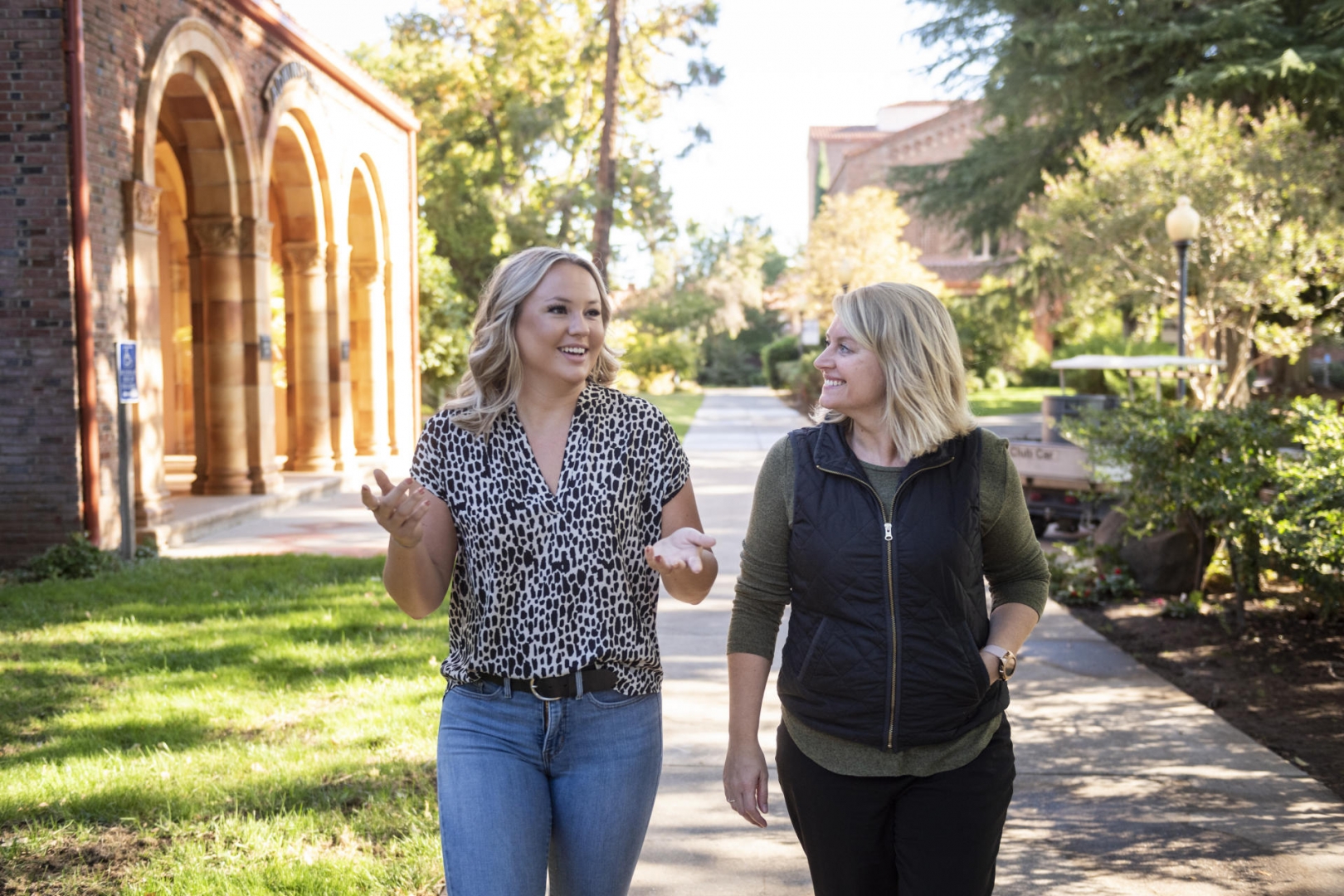A Heart for Caring

Brittany Spade (center) handles volunteer management in her position working with the Camp Fire liaison, toured the Big Chico Creek Ecological Reserve on Thursday, October 10, 2019 in Chico, Calif. (Jason Halley/University Photographer/CSU, Chico)
Editor’s Note: As we approach the one-year anniversary of the Camp Fire, we are honoring its impact on our community with a series of stories embracing the themes of remembrance, recovery, and resurgence.
Brittany Spade was in the midst of a semester-long study abroad stint in Verona, Italy, when she learned the Camp Fire was ripping through communities close to Chico State. And while she was physically safe from the fire’s path, it didn’t leave her with a sense of comfort—knowing people very dear to her were still dealing with it.
“I didn’t like that I couldn’t help and take care of the people I needed to take care of,” Spade said.
When she returned to Chico for the spring 2019 semester, the recreation administration major felt compelled to help, organizing smaller events within communities affected by the Camp Fire in hopes of making everyday life, planning, and rebuilding a little easier for those impacted.
Around the same time, Megan Kurtz—lecturer in the Department of Recreation, Hospitality, and Parks Management—was appointed Chico State’s Camp Fire campus and community liaison to participate in the county’s Camp Fire Long-Term Recovery Group. For months, Kurtz had attended meetings, facilitated conversations about cleanup and recovery, and helped guide national and international research teams around the burn scar—all by herself. As her commitments grew, she realized that, if she was going to do her job with the attention and care it deserved, she needed help.
“I was starting to lose track of some of the smaller, more detailed items when I was looking at the bigger picture of things,” Kurtz said. “I knew I needed support in organizing all of that and making sure that other people’s experiences with the recovery didn’t get lost.”
Over the summer, Kurtz put out the call for a community liaison intern. When Spade applied, she was welcomed with open arms and no shortage of tasks. Working 20 hours a week since the beginning of the fall semester, Spade, who is set to graduate in May, is a valued asset and complement to Kurtz’s efforts.
On her first day, Spade and Chico State’s Ecological Reserves director Eli Goodsell traveled to the Big Chico Creek Ecological Reserve with researchers from UCLA and the University of Washington to discuss the merits of forest therapy—helping to lay the groundwork for a since-approved pilot project focused on increasing wellness services to Camp Fire survivors.

In the weeks that followed, Spade has provided another important set of eyes and ears during Long-Term Recovery Group meetings and played a vital role in supporting Chico State’s identity as a partner and neighbor. Sitting in the room with top-level administrators, community leaders, and federal agencies tasked with cleanup, rebuilding, and recovery, Spade takes diligent notes, shares thoughts and ideas, and helps coordinate efforts—tapping her natural connection to students whenever possible.
“Anytime we’re in a meeting or we go speak in a class or a professor and a group of students want to do something inside of an academic lesson, Brittany is the one that coordinates all of that and gets volunteers out to the community,” Kurtz said. “What the community needs from the University in terms of volunteers, she’s the one pushing that out.”
As Spade connects students to service-learning and civic engagement opportunities—like prepping and serving free weekly Thursday night dinners at the Paradise Alliance Church or filling support volunteer requests for the one-year events—her mind is always turning about ways campus can help the community. Kurtz said that during one meeting, residents impacted by the fire began talking about the many documents that perished, like birth certificates and passports.
“Brittany said, ‘The Passport Place on campus is a community resource to get passports taken care of quickly,’” Kurtz said. “She wanted to make sure we were telling the towns of Paradise, Magalia, and Concow about this.”
Being present in meetings—and sitting on the one-year anniversary planning committee—also means Spade is being pushed to perform tasks outside of her comfort zone, including outreach and response to a wide range of people, networking, and providing aid in a way she’s never had to before.
Kurtz has been extremely impressed with Spade’s desire and drive to get things done, and has admiration as she watches her do such difficult work with a rare and genuine compassion.

“She’s guided by a deep work ethic and she has a humble confidence,” Kurtz said. “And she navigates a space really well, but she does so humbly.”
“Brittany has generosity at the core of what she does,” she continued. “She really wants to help, she really wants to help people, she wants to tangibly help people. She just has that heart for it.”
The daily work Spade is doing as a community liaison—listening, planning, and implementation—directly aligns her growing aspirations for a career in the hospitality industry with her major, in which she is pursuing options in both event management and resort and lodging management.
“It’s a different experience, and it’s a different environment, but it’s still that planning and hand-holding,” Spade said. “It’s taking care of people.”
She recognizes the Camp Fire’s recovery efforts have created a unique situation and opportunities—in ways ranging from simply being a listener to rebuilding entire communities. She hopes to do that role justice.
“I’ve learned that we have a lot of rebuilding to do in so many departments in the community, and it’s going to take a really long time to rebuild as a whole,” she said. “It’s important just to care for your neighbor, and I want to be that person.”


